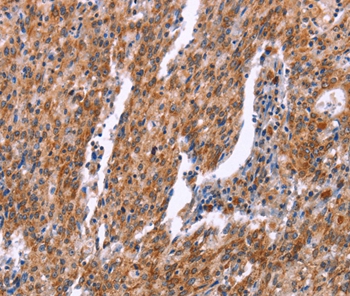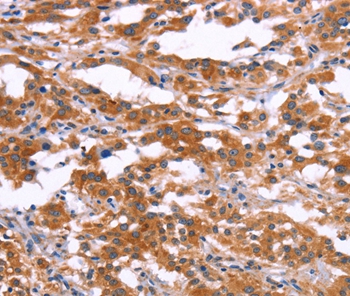

| WB | 咨询技术 | Human,Mouse,Rat |
| IF | 咨询技术 | Human,Mouse,Rat |
| IHC | 1/25-1/100 | Human,Mouse,Rat |
| ICC | 技术咨询 | Human,Mouse,Rat |
| FCM | 咨询技术 | Human,Mouse,Rat |
| Elisa | 咨询技术 | Human,Mouse,Rat |
| Aliases | RSK4; PP90RSK4 |
| Entrez GeneID | 27330; |
| Host/Isotype | Rabbit IgG |
| Antibody Type | Primary antibody |
| Storage | Store at 4°C short term. Aliquot and store at -20°C long term. Avoid freeze/thaw cycles. |
| Species Reactivity | Human |
| Immunogen | Synthetic peptide corresponding to residues near the N terminal of human ribosomal protein S6 kinase, 90kDa, polypeptide 6 |
| Formulation | Purified antibody in PBS with 0.05% sodium azide. |
+ +
以下是关于RPS6KA6抗体的3篇参考文献及其简要摘要:
1. **"Characterization of RPS6KA6 in cellular stress response"**
*作者:Smith A, et al. (2018)*
摘要:该研究通过Western blot和免疫荧光技术,使用特异性RPS6KA6抗体,揭示了该激酶在氧化应激条件下调节MAPK信号通路的作用,并发现其在细胞存活中的关键功能。
2. **"RPS6KA6 expression profiling in colorectal cancer tissues"**
*作者:Chen L, et al. (2020)*
摘要:利用RPS6KA6抗体对结直肠癌组织进行免疫组化分析,发现该蛋白在肿瘤组织中高表达,且与患者预后不良相关,提示其可能作为潜在治疗靶点。
3. **"Functional analysis of RPS6KA6 knockout mice using antibody-based validation"**
*作者:Yamamoto K, et al. (2016)*
摘要:通过RPS6KA6抗体验证基因敲除小鼠模型,发现该激酶缺失导致神经发育异常,并影响CREB磷酸化过程,表明其在神经信号传导中的重要性。
注:若需具体文献来源,建议通过PubMed或Google Scholar以关键词“RPS6KA6 antibody”或“MSK4 antibody”进一步检索。部分研究可能需结合抗体应用场景(如WB/IHC)筛选。
The ribosomal protein S6 kinase alpha-6 (RPS6KA6), also known as p90RSK4. is a serine/threonine kinase belonging to the RSK (ribosomal S6 kinase) family. It is activated via the MAPK/ERK signaling pathway and plays roles in regulating cell growth, differentiation, survival, and stress responses. The RPS6KA6 gene is located on human chromosome 12q23.3 and encodes a protein containing two distinct kinase domains (N-terminal and C-terminal) regulated by phosphorylation events, primarily through ERK1/2. RPS6KA6 phosphorylates downstream targets, including transcription factors (e.g., CREB) and cell cycle regulators, influencing gene expression and cellular adaptation.
Antibodies targeting RPS6KA6 are essential tools for studying its expression, activation, and subcellular localization in various tissues and disease models. These antibodies are widely used in techniques like Western blotting, immunohistochemistry (IHC), and immunofluorescence (IF) to investigate RPS6KA6's role in cancer progression, neurodegenerative disorders, and metabolic diseases. Due to the structural homology among RSK family members, RPS6KA6-specific antibodies must be rigorously validated for cross-reactivity. High-quality antibodies often undergo verification using knockout cell lines or siRNA-mediated silencing. Research on RPS6KA6 has gained interest for its potential as a therapeutic target, particularly in cancers with dysregulated MAPK signaling.
×